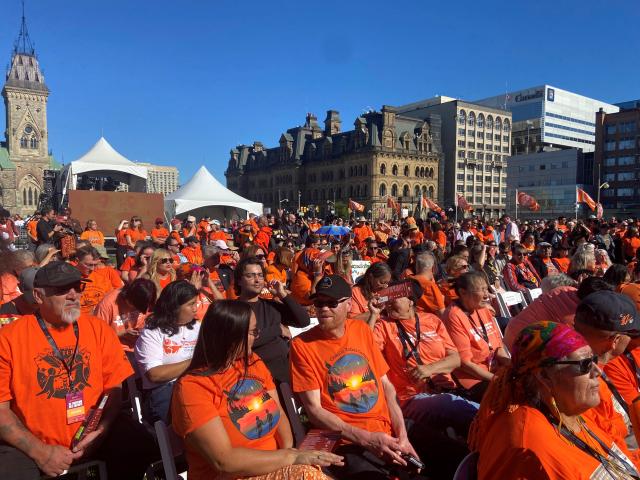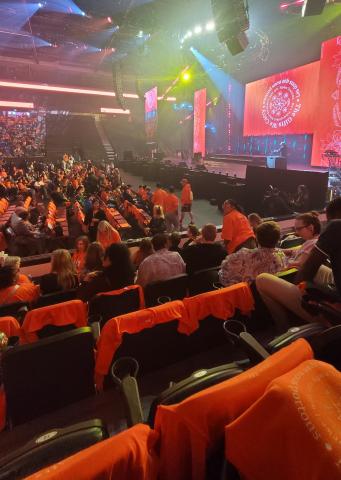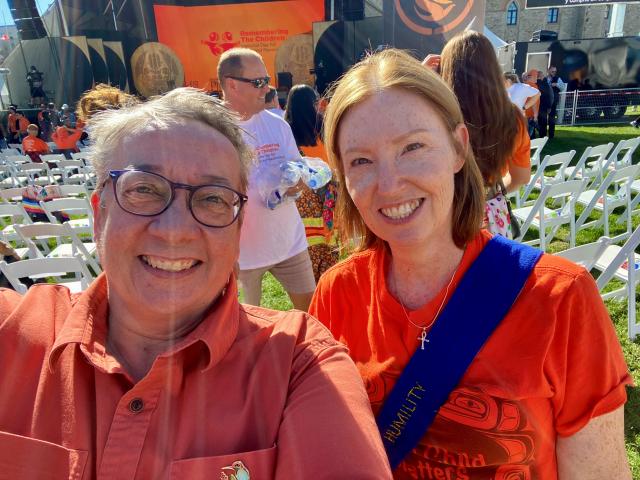At an event honouring residential school survivors, United Church members reflected on the damage of the past and on the way forward

With the National Day for Truth and Reconciliation on September 30, United Church members and communities of faith across the nation paused to solemnly reflect on the legacy of colonialism and the residential school system, as well as the church’s responsibility for the past and the nature of its role in the future of Reconciliation.
In this spirit, leaders and members from the United Church attended events planned by the National Centre for Truth and Reconciliation (NCTR) across the country this month, designed to honour survivors and carry forward the gifts of Indigenous culture.
Kupa Munikwa, a student and United Church member, attended “The Gifts We Carry,” the NCTR’s youth empowerment gathering for teachers and middle and high school students, held on September 18 at the Scotiabank Centre in Halifax, Nova Scotia and now available to watch online.
In a vibrant celebration of the generational gifts passed down to those present, Indigenous culture, music, and dance were shared over the course of the two-hour gathering. It also opened a dialogue with young people about the truth of Canada’s residential school system, with Residential school survivors and Sixties Scoop survivors sharing their stories, as well as Elders and changemakers.

“One of the speakers highlighted how both listening and sharing are essential parts of reconciliation. It reminded me of how important it is to create spaces for Indigenous and Racialized youth to share and connect,” said Munikwa. “Gatherings like this continue to shape my understanding of what it means to be in right relationship with others.”
Munikwa was also especially inspired by a message from one of the speakers, who emphasized the importance of true uniqueness and creativity, which begin with learning your culture and getting in touch with who you are. It led her to reflect on the power of cultural rediscovery in the face of colonialism, as well as the lessons the day held for adults in the church.
“My encouragement to older adults in the United Church is don't be afraid to listen, even when it's uncomfortable. Reconciliation isn't just about programs or public statements, it's about relationships rooted in truth, humility, and accountability,” said Munikwa. “As a racialized young person in the United Church, I have seen and know inclusion is not enough unless people feel seen, heard, and valued. It's important to make space for stories that challenge the dominant narrative, and try to learn and reflect on those stories. Reconciliation is work that involves openness and courage.”
On September 30, the Right Rev. Dr. Kimberly Heath, Moderator of the United Church, and Sara Stratton, Reconciliation and Indigenous Justice Animator, Indigenous Ministries and Justice, attended “Remembering the Children” at Parliament Hill in Ottawa. A powerful, challenging, solemn, and celebratory gathering held to honour the survivors of residential schools as well as to pay tribute to those who did not survive, as well as the families and communities that were irrevocably affected.
The event saw survivors speak, as well as others including Governor General Mary Simon, the first Indigenous person to have held the role, and Prime Minister Mark Carney.
Powerful performances from Indigenous artists rose to the moment. Sara Stratton was struck by the energy and emotion of attendees when Julian Taylor, a musician of Mohawk and Black Canadian descent, sang his song “Seeds” after the Memorial Cloth, which contains the names of thousands of children who died in residential institutions, was carried through the crowd.
A recording of the “Remembering the Children” proceedings is available on YouTube. Read on to hear from the Moderator and Sara Stratton, reflecting on the experience of the day, Reconciliation, and the path forward for the United Church of Canada.

As the Moderator, do you imagine how you engage with Reconciliation will shift? If so, what do you think that might look like?
Moderator: On Tuesday I was honoured to participate in the Truth and Reconciliation ceremony on Parliament Hill. Helping to carry the Memorial Cloth on which is written the names of the students of Residential Schools who never made it home was deeply impactful. It reminded me of a visit to Vimy Ridge, where the names of the slain soldiers are etched in stone—the names turn to real people as you read them. But this was so much more powerful and heartbreaking because the names I carried were the names of children, not men, and because I am the head of a church that operated some of those schools.
At a recent staff meeting, Springwater Hester-Meawassige began her presentation with a quote from Justice Murray Sinclair where he reminds us that Reconciliation is a long road that has no shortcuts. I do not plan to shift how I continue the work of Reconciliation. My role is to continue to walk on that challenging and rich road. The shift I see is in the tiniest signs of healing, the smallest strands of hope that the future will be better for future generations of Indigenous Peoples than it is today and has been.
When you think about our responsibility to Reconciliation and Indigenous justice as Christians and Canadians, what scriptures/readings/teachings come to mind that might remind us that this is sacred work?
Moderator: The scripture that comes to mind is Hebrews 12:1–3, “Therefore, since we are surrounded by so great a cloud of witnesses, let us also lay aside every weight and the sin that clings so closely, and let us run with perseverance the race that is set before us, looking to Jesus, the pioneer and perfecter of faith, who for the sake of the joy that was set before him endured the cross…”
I will continue to carry the names written on the cloth—part of the great cloud of witnesses—as I listen to and learn from the Indigenous Church, and as we follow Jesus knowing that while this road is long and challenging, it is worth every step.
Sara, you have been in the Indigenous Justice Animator role for some time. How has your perspective on the work shifted throughout the years?
Sara Stratton: I prefer to answer this as what are some things I have learned—because these learnings have shifted how I see and do the work. I have learned that no matter how much I know (or think I know), I always have more to learn from others. No matter how well-intentioned I am, I may be wrong, and I may cause harm without even knowing it. I have learned to be quiet and to listen.
Your work is primarily with the settler church. When it concerns Reconciliation, where have there been areas of growth and where is growth needed?
Sara Stratton: I think it is positive that so many people now understand that what the church did to Indigenous peoples in residential and day institutions, missions, and hospitals was not an aberration, but rather a key piece of racist colonial policy. And an increasing number of them are beginning to understand how their own story as descendants of settlers, or as newcomers, is intertwined with that.
I’ll name two areas for growth. One is understanding that colonial policies continue to this day to negatively impact Indigenous people—in education, healthcare, child welfare, and justice systems; in violence against Indigenous peoples; in lack of access to land and resources; and in violation of treaty and nation-to-nation relationships. The other is acknowledging the racism and white privilege that uphold those policies and behaviours, and all that those of us who are white carry with us and benefit from. If we truly want to reconcile, then we need to find a way to challenge that in ourselves, and to let go of control. All the petitions, letters, and marches in the world won’t change a thing if we don’t.